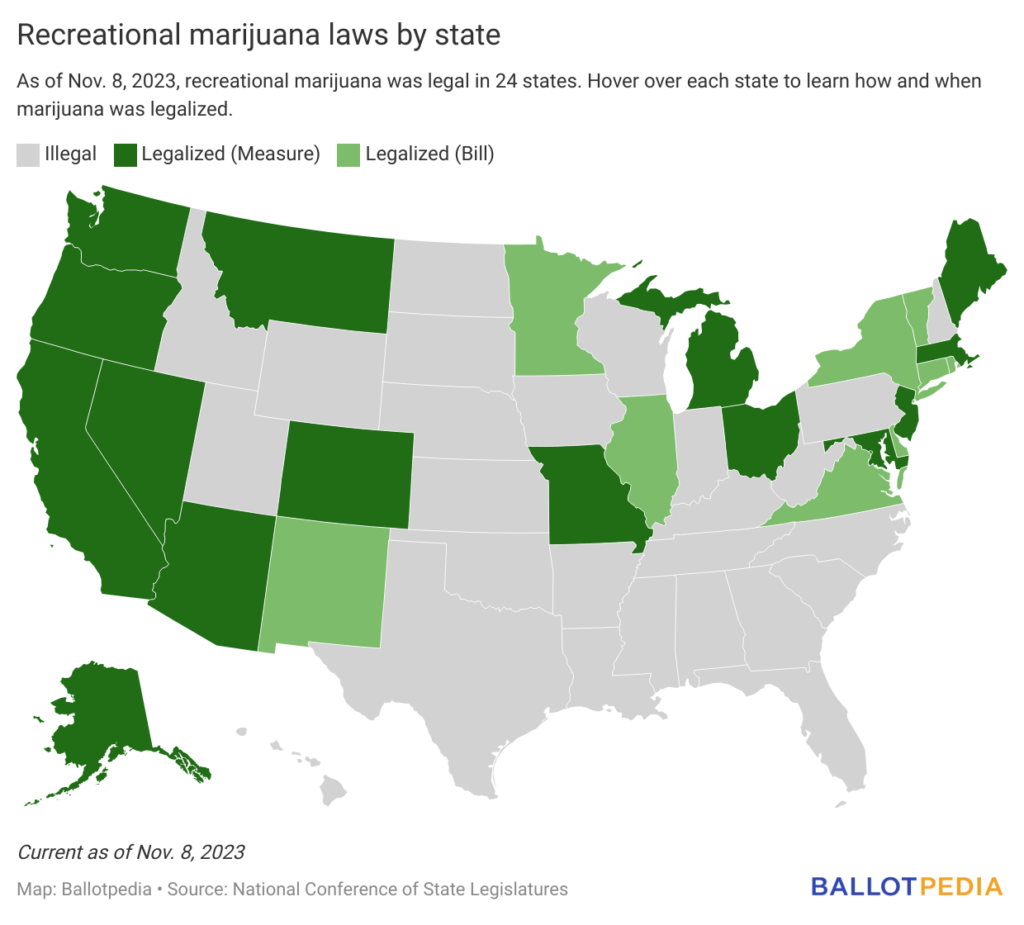South Dakota voters will decide on an initiative to legalize recreational marijuana on Nov. 5, 2024.
If approved by voters, the measure, titled Initiated Measure 29, would legalize the recreational use, possession, and distribution of marijuana for people who are 21 and over. It would provide for possession limits of 2 ounces of marijuana, 16 grams of concentrated cannabis, and 1,600 mg of THC contained in cannabis products. Initiated Measure 29 also allows cultivation of plants with restrictions.
This is the third attempt from the campaign to legalize marijuana in the state.
In 2020, South Dakota voters approved Constitutional Amendment A by a vote of 54.18%-45.82% to legalize recreational marijuana. Voters also approved Initiated Measure 26 in the same election, which legalized medical marijuana. However, in 2021, Circuit Judge Christina Klinger ruled that the measure was unconstitutional, finding that it violated the state’s single-subject rule and constituted a revision of the constitution rather than an amendment. South Dakotans for Better Marijuana Laws, who also sponsored Amendment A, appealed to the South Dakota Supreme Court, which upheld the lower court ruling.
In 2022, South Dakotans for Better Marijuana Laws qualified another marijuana legalization measure for the ballot, Initiated Measure 27, which would have legalized the recreational use of marijuana for anyone over 21. Voters rejected the measure by a vote of 47.08%-52.92%.
In South Dakota, the use, possession, or distribution of recreational marijuana is illegal.
Zebadiah Johnson, the political director for South Dakotans for Better Marijuana Laws, said, “We firmly believe that South Dakotans deserve to make their own choices on how they live their lives, including the freedom to responsibly use cannabis.”
Matthew Schweich, the campaign director for South Dakotans for Better Marijuana Laws, mentioned the legal status of alcohol as an argument for the legalization of recreational marijuana. He said, “I think for me, the strongest reason at its core is that if we’re going to allow alcohol to be legal in our society, then it makes absolutely no sense to punish people for using cannabis because alcohol is more harmful to the individual and to society than cannabis.”
Rhonda Milstead, who is now executive director of Protecting South Dakota Kids, which opposed Initiated Measure 27 in 2022, said that legalizing marijuana can cause harm to communities, saying, “Protecting South Dakota Kids believes that when South Dakotans know the truth about the harm marijuana causes to our children, the safety of our communities, our health, and our environment they will vote no in November.”
Jim Kinyon, the chairperson of Protecting South Dakota Kids, brought up previous marijuana initiatives, saying, “How many times does the state of South Dakota need to reject recreational marijuana before the industry will accept the decision of the state’s citizens?”
Currently, 24 states and Washington, D.C., have legalized the possession and personal use of marijuana for recreational purposes. Ohio became the 24th state to legalize marijuana on November 7, 2023, when voters approved Issue 2 by 57.19%-42.81%. This year, Florida voters will be voting on an amendment to legalize the recreational use of marijuana, and an initiative to legalize recreational marijuana in Nebraska may appear on the ballot in the state, with a deadline to submit signatures on July 5, 2024.

There are six statewide ballot measures on the Nov. 5, 2024, ballot in South Dakota. They are:
- Constitutional Amendment E: Would amend the state constitution to change male pronouns in the Constitution to gender-neutral terms or titles
- Constitutional Amendment F: Would amend the state constitution to provide that the state "may impose a work requirement on any person ... who has not been diagnosed as being physically or mentally disabled" for eligible individuals to receive Medicaid under the Medicaid expansion that took effect on July 1, 2023
- Constitutional Amendment G: Would provide a trimester framework for regulating abortion in the South Dakota Constitution, making abortion legal in South Dakota with regulations after the first and second trimester
- Constitutional Amendment H: Would replace partisan primaries with top-two primaries for state executive, state legislative, congressional, and county offices
- Initiated Measure 28: Would prohibit state sales taxes on anything sold for human consumption, not including alcoholic beverages or prepared food.
- Initiated Measure 29: Would legalize the recreational use, possession, and distribution of marijuana
Additional reading:



